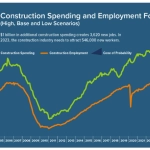US Labor department offering online seminar on prevailing wage compliance
By Mitchell Keller | Originally posted on constructionbriefing.com
Citing divisional efforts to “increase awareness and improve compliance”, the US Department of Labor (DOL) will hold an informational seminar on 29 August to cover the ins-and-outs of prevailing wage rules on federally-funded projects.
The full-day meeting will deliver sessions detailing labour standard protections from the Davis-Bacon Act and Service Contract Act and offer guidance to contractors and service providers on how to meet contractual expectations dictated by those US labour laws.
US DOL Wage and Hour Administrator Jessica Looman said historic investment in US infrastructure means “a significant increase in the number of federal and federally funded projects, and the Wage and Hour Division is committed to ensuring stakeholders understand the labour standards protections critical to these investments.”
Two DOL prevailing wage seminars have already been held this year: one in February and a second in May.
The seminar is scheduled for Thursday, 29 August, 2024, from 11 a.m. to 5:30 p.m. EDT. The seminar is free to attend but registration is required.
Wages and labour agreements a hot topic in US construction
The discussion on prevailing wages turned litigious this year, particularly as they pertain to federally-enforced Project Labor Agreements (PLA); pre-hire collective bargaining agreements that establish terms and conditions for employment on a specific construction project.
Two national contractor and builder associations – the Associated Builders and Contractors (ABC) and the Associated General Contractors of America (AGC) – have sued the US government for making PLAs mandatory on projects valued US$35 million or more. The AGC dispute was dismissed earlier this year, while state chapters of ABC have had some success challenging specific regional contracts.
In an election year in the US, some contractors may have been waiting to bid on large federally-funded projects to avoid needing to comply with PLA requirements. It’s expected that a Republican president with support in Congress could pass laws to eliminate or deregulate PLAs. On the other hand, a Democratic president with support from Congress would be likely to maintain and expand on PLA regulations.
“It’s all about, not necessarily where the policies are going, because we can figure out policies and people can react to that, but it’s about uncertainty of the change, and that’s what’s pausing people,” she said.
At least two major contractors – Tutor Perini and Skanska USA – suggested the pool for massive infrastructure projects was thin and waning; that firm said it was the lone bidder on more than one multi-billion project during the year’s second quarter.
Ultimately, mid-sized contractors would be wise to learn how to accommodate federal contracts with PLAs (or partner with a firm that does) or risk losing substantial work to larger competitors.



